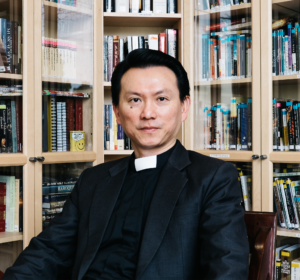We see in these verses that God is a God who also struggles, who suffers along with His people, whose heart is moved by His people. When we love someone, whatever happens to that person also affects us. Likewise, because God loves His people, He suffers because of their sins whilst also punishing them for their sins. God is sovereign over all things but, at the same time, He is present and understands what we are going through. He suffers when His people suffer, and the greatest suffering of God was revealed in the suffering of His only Son, Jesus Christ. Throughout His life, Jesus Christ experienced our suffering – temptation, pressure, hunger, thirst. He was slandered, cursed, mocked, and wrongly accused (Jeremiah 3:3). DA Carson once said that the God we worship knows our suffering, not just cognitively because He knows all things, but because He Himself went through it. At the climax of His suffering, He was left by His own Father: “My God, why have thou forsaken Me?” There was no comfort at all from God the Father for Jesus Christ. Christ did not feel any love from God, nor pity, nor help. God had been His sun, but that day, the sun had turned into darkness. God was everything to Christ, but on the cross God left Him. He truly felt God’s condemnation when He said, “Depart from Me, you cursed.”
Understanding that God empathizes and understands our suffering is comforting. Even more so when we know that Christ suffered for us. In all our struggles, may we not waste our time, and instead use it to know our God, who shares in our suffering.
The suffering of God’s people is not the end of the story, just as Christ’s suffering and death was not the end of the story in the Bible. In Revelation 6:9-10, the People of God throughout history cry out to God by saying, “How long, oh Lord, will injustice continue and how long will your people continue to be persecuted?” The answer to this question can be found in Revelation 5:1. A lot of interpreters say that this scroll contains the secret and the purpose of everything that has happened in history. This is the grand plan of God, which also contains the reason why the people of God suffer. The focus of these verses is the lamb who was slain. He is the only one who can open the scroll. The lamb who was slain is not depicted as someone with great power and might – that is the truth that John wants to reveal to us. The Bible teaches us that when Jesus Christ died on the cross as the lamb who was slain, He disarmed the ruler of the darkness. On that cross, He wiped away the record of our death. This is the victory of Jesus. The greatest sin – the murder of God’s only Son – revealed God’s greatest love.
This is the centrality of the cross of Christ. In all the sufferings we go through, may we continue to come to Christ’s cross and understand that He not only suffered for us but also defeated the power of evil. The cross does not only invite us to look back at how Christ had suffered for us, but also to look forward and understand that He will also undo evil. When Christ comes again, He will not only judge evil righteously, but evil will also be undone. The perfect and wonderful will of God will be done on earth. In Revelation 7:16-17, we see an image of the restoration of all things. This is the beautiful message of the Bible. This is the hope of the people of God – that after all the suffering we go through, we will not only be comforted, we will not only see the evil of the world be judged by God, but God will also undo evil and give us a new heaven and new earth, where sin will be no more. May this truth comfort and strengthen our understanding that God does not only know our suffering, but He also suffers along with us.



